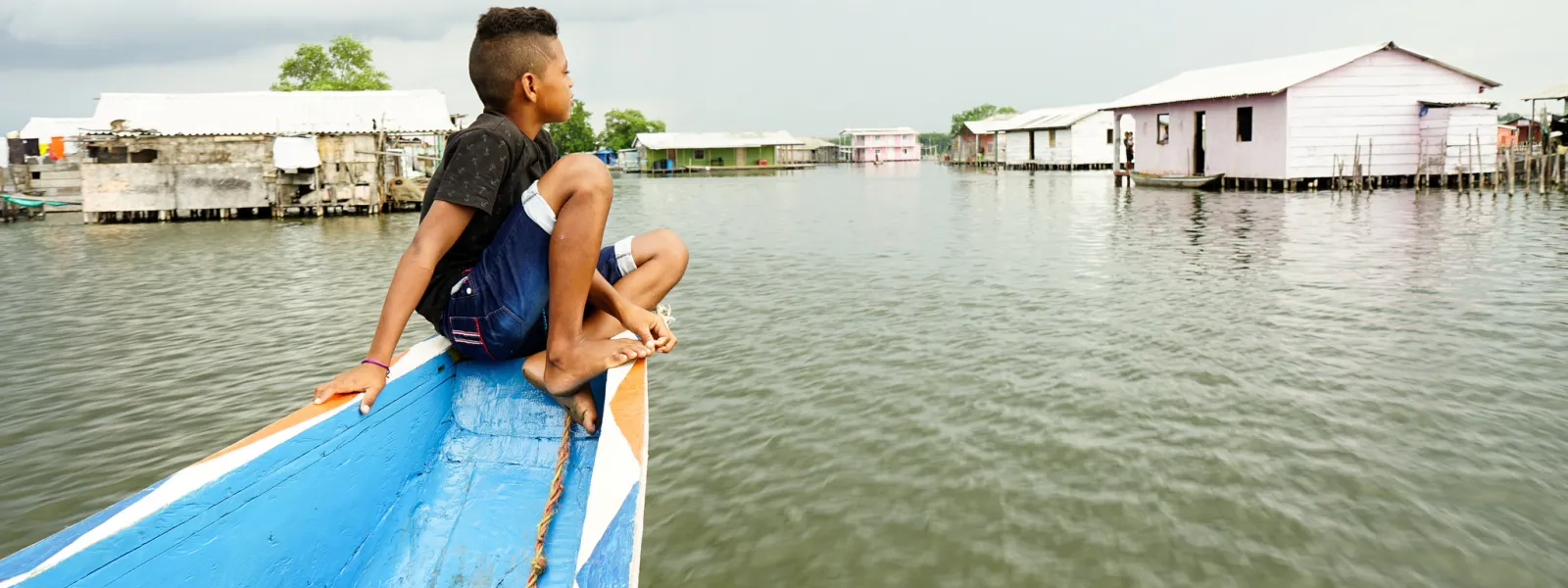
Project
Photo: Anna Laurie Miller / AIDAConserving the Ciénaga Grande de Santa Marta
Ciénaga Grande de Santa Marta, the largest and most productive coastal wetland in Colombia, covers 45,000 hectares. At the confluence of the Magdalena River and the Caribbean Sea, the site boasts an immense variety of flora and fauna, including mammals, birds and fish. Its southern tip is a beautiful sanctuary of mangroves, swamp and amphibious forest.
On the calm waters of the marsh stand the Ciénaga’s famous stilt villages, supported by pillars or simple wooden stakes and inhabited by local fishermen since 1800. In a place accessible only by water, many of the things we take for granted—being served a glass of water, quick access to a doctor—are considered luxuries. Residents depend on the natural world around them. Sadly, in recent years mass fish die-offs caused by the marsh’s degradation have threatened the livelihoods of 2,500 people who call the Ciénaga Grande home.
Illegal activities are destroying this vital ecosystem: intentionally set forest fires, deforestation of large tracks of land for agriculture and livestock, logging and burning of mangroves, and 27 kilometers of illegally built dikes.
This destruction not only devastates the local fishery; it also has global impact. Ciénaga Grande’s mangroves absorb large quantities of carbon dioxide from the atmosphere, aiding in the global fight against climate change.
The importance of the Ciénaga Grande has been recognized both nationally – the Sanctuary of Flora and Fauna Ciénaga Grande de Santa Marta is a national park – and internationally: UNESCO’s Man and the Biosphere program declared the lagoon a biosphere reserve; and the Ciénaga Grande is listed as a Wetland of International Importance under the Ramsar Convention, an intergovernmental treaty for the protection of wetlands.
AIDA and our partners are advocating for the Colombian government to fulfill its national and international obligations to protect the Ciénaga Grande. After all, millions of animals, the local community, and our global climate depend on it.
Partners:
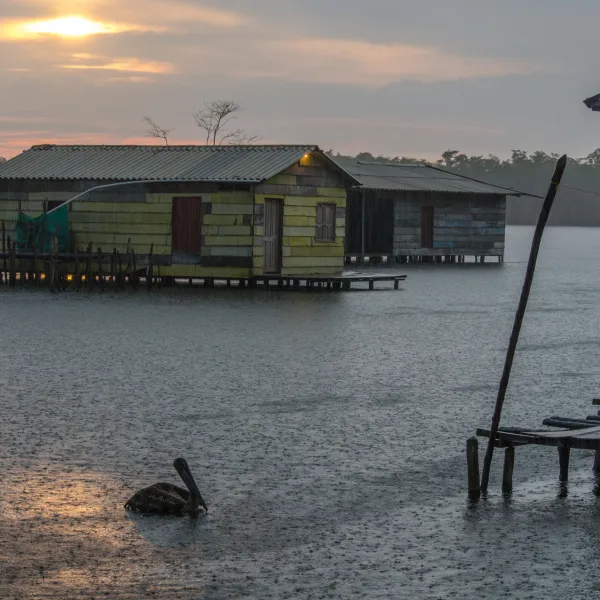
Related projects
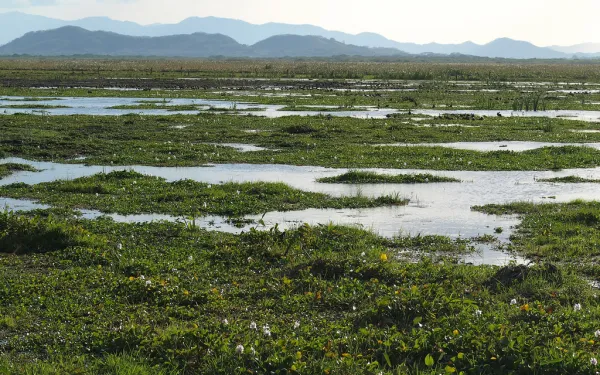
Costa Rica launches wetlands protection policy
On March 6, Costa Rica’s rivers, lakes, mangroves and other wetlands became better protected when the government launched its first national policy for their sustainable management. The National Wetlands Policy (2017-2030) was created to preserve and revitalize the nation’s wetlands and the great biodiversity they house. The Ministry of the Environment, the National System of Conservation Areas, and the United Nations Development Program created the historic public policy instrument over the last year and a half. AIDA helped develop the policy, providing comments based on international environmental law. We drew from our experience helping Mexico craft its own wetlands policy in 2014. “We sought to ensure that the National Wetlands Policy was in alignment with Costa Rica’s obligations under the Ramsar Convention, an intergovernmental treaty that states all countries should have a wetlands policy and provides governments with assistance protecting wetlands in their territory,” explained Gladys Martínez, senior attorney with AIDA’s Marine Biodiversity and Coastal Protection Program. Costa Rica’s Organic Law of the Environment defines wetlands as ecosystems that depend on both sweet and brackish water, are natural or artificial, and which can be permanent or temporary. Therefore, wetlands are not just bodies of water like rivers and lakes; they’re also marshes, mangroves, flood plains, and coral reefs, among others. “In Costa Rica we have thousands of wetlands that represent roughly seven percent of the national territory,” stated Edgar Gutiérrez, the Minister of Environment and Energy, in a statement released to mark the launch of the policy. “This policy will help improve the governance and protection of these resources, paying off a historic debt to our vital ecosystems.” Five main components The policy’s action plan is based on five strategic themes: Conservation of wetlands, their goods and services: Avoid future losses of wetlands and mitigate factors that endanger their health and wellbeing. It also proposes the creation of a National Inventory of Wetlands. Climate adaptation and rational use: Identify which wetlands are the most vulnerable to climate change and to carry out mitigation actions. Ecological rehabilitation: Once vulnerable wetlands are identified, recovery actions will be planned. Strengthening institutional support for adequate management: Better coordination and communication between the entities in charge of the management and conservation of wetlands. Inclusive participation: Citizens should be involved and participate actively in wetland-conservation processes. Community consultation It’s particularly important to celebrate the participatory nature of the policy. Many Costa Ricans base their lives and livelihoods on the health of wetlands and other natural environments. Now, instead of removing the public from decision-making, the government officially recognizes the importance of consultation. “The most important aspect of the policy is that, in addition to complying with the Ramsar Convention, the government is also complying with other international conventions that promote consultation,” Martínez explained. Costa Rica’s new policy represents a significant advance in defense of the environment. It shows the region that progressive environmental policies are possible. At AIDA we’re happy to say “Pura Vida!” to the wetlands. We hope more countries will join in their protection.
Read more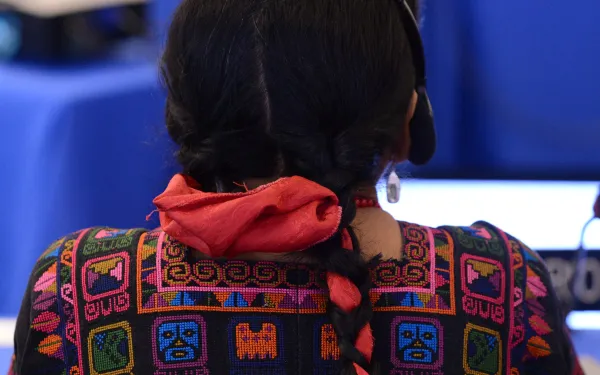
Attacks against Guatemalan human rights defenders denounced
Communities and organizations appealed to the Inter-American Commission on Human Rights, urging the State of Guatemala, private businesses, and investors to guarantee the human rights of people and communities affected by large hydroelectric projects. They presented a report, outlining 10 different cases, which documents 273 incidents of threats, criminalization, and attacks against defenders, traditional authorities, journalists, and communities. Criminalization included 103 arrest warrants, imprisonment of 36 defenders, and the murder of 11. Washington, DC, United States. A coalition of communities and organizations denounced human rights violations against traditional and indigenous communities in Guatemala, at a hearing before the Inter-American Commission on Human Rights. Because of their opposition to large hydroelectric projects, the human rights defenders have been threatened, assaulted, treated as criminals, and assassinated. A report presented before the Commission, featuring 10 different cases, notes that various communities confronting these projects have faced rights abuses including violations of their rights to free, prior, informed, and culturally appropriate consultation; self-determination; due process; and life. The report also outlines how those who defend affected people and communities have been victims of threats and aggressions. The most common attacks include arrest warrants (103), assaults resulting in injuries (56), imprisonment (36), detention (25), criminalization (16), and threats (15). There have been 11 documented murders and three conflict-related deaths in communities that oppose these hydroelectric projects. At least 19 companies are linked to hydroelectric projects in Guatemala, of which 55 percent are national, 40 percent are transnational, and five percent are State-owned. The complaints emphasized that it is the duty of the State to guarantee the rights of communities, and of the people who defend them. The obligation to respect human rights also extends to operating companies and project funders. Therefore, the organizations and communities ask the Guatemalan State to: Comprehensively respect the rights of indigenous people, including the rights to self-determination; consultation; and free, prior, informed, and culturally appropriate consent. Ensure the safety of human rights defenders. Include the participation of indigenous communities in the design and implementation of their energy-development policies. They also request the companies involved to: Comply with due diligence in matters of business and human rights. Refrain from taking actions, such as filing lawsuits, that result in criminalization of and attacks on human rights defenders. Publicly recognize the positive and fundamental role of human rights defenders in democracy. The complete report (in Spanish) is available here. Authors Include: Acompañamiento de Austria (ADA); Asamblea Departamental de Pueblos de Huehuetenango (ADH); Asociación de Abogados Mayas de Guatemala; Asociación Indígena Ch`Orti` Nuevo Día; Interamerican Association for Environmental Defense (AIDA); Business and Human Rights Resource Center; Consejo del Pueblo Maya (CPO) Consejo Mam; Guatemala Human Rights Commission, USA (GHRC); Guatemala Solidarity Network; Microregión de Ixquisis, San Mateo Ixtatán; The Swedish Fellowship of Reconciliation (SweFOR); PAYXAIL YAJAW KONOB (Gobierno Ancestral Plurinacional) AKATEKA, CHUJ, POPTI’, Q’ANJOB’AL; International Platform Against Impunity; Protection International; Proyecto Acompañamiento Quebec Guatemala Montréal, Canadá; Resistencia Río Dolores and Unidad de Protección a Defensoras y Defensores de Derechos Humanos (UDEFEGUA). Press contacts: Karen Hudlet, Business and Human Rights Resource Center, [email protected] Rodrigo da Costa Sales, Interamerican Association for Environmental Defense (AIDA), [email protected]
Read more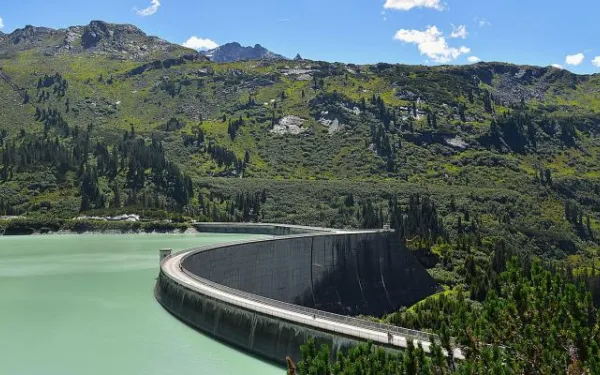
Changing the way we approach large dams
Cigarettes once served to cure cough; lead-based makeup was fashionable; and DDT, a highly toxic insecticide, was used in gardens where children played. At the time, little was known of their grave impacts on health and the environment. These facts may shock us now, but once they were normal. Cigarettes, lead, and DDT were widely believed to be more beneficial than harmful to humanity. Thanks to science, we learned of their serious health and environmental impacts. We’re learning the same now about large dams. A photograph of a dam surrounded by trees is as misleading as the doctor-approved cigarette ads once were. In the last decade, we’ve seen that the damage dams do to communities and ecosystems is far greater than the benefits they provide. Recently, an academic study confirmed something even more worrying: large dams aggravate climate change. At the end of 2016, researchers from Washington State University (WSU) concluded that reservoirs around the world, not just those in tropical areas, generate 1.3 percent of the total greenhouse gases produced by mankind. Dams, they found, are an “underestimated” source of contaminating emissions, particularly methane, a pollutant 34 times more effective at trapping heat than carbon dioxide. These findings have not yet been properly absorbed. Large dams continue to be funded and promoted as clean energy. Some countries boast nearly 100 percent renewable energy, yet reports show that at least half of that is hydroelectric energy, produced primarily by large dams. Violating human rights Even before WSU’s study was made public, the damage large dams do to communities and the environment was well documented. Dams disrupt traditional lifestyles, and affected communities are forced to adapt to new environmental conditions, such as altered river flow and species migration. Many communities have also been victims of forced displacement and fall into poverty as a result. In the Brazilian Amazon, the Belo Monte Dam provides a prime example of the ways dams cause negative impacts on both people and the environment. At AIDA, we’ve worked hand-in-hand with the indigenous and river communities of the Xingu River Basin, who have seen the trees fall around them, the red earth spread like a stain across their forest, the fish disappear from their rivers, and their small islands submerged. For those living in Altamira, the city nearest the dam, living conditions also worsened significantly, with increased violence, substance abuse, and prostitution. This story has been repeated thousands of times around the world. According to International Rivers, 57 thousand large dams had been built by 2015, disrupting more than half of the world’s rivers and causing the displacement of at least 40 million people. What can we do? Although the WSU study may surprise governments and corporations that promote the construction of large dams, for the health of the planet the trend must be stopped. Environmentally friendly alternatives exist, which do not imply the same social, economic and climatic impacts as dams. Hope can be found in the Brazilian Amazon with the Munduruku tribe. Last year, their long fight paid off with the cancellation of a large dam project on the Tapajós River, the sacred waterway on which their lifestyle depends. The decision to cancel the dam was backed with evidence of the impacts dams have on communities and ecosystems, exemplified by the case of Belo Monte. Recently, the Munduruku gathered to discuss and find solutions for the threats they continue to face as development rages in the Amazon. Solutions include the decentralization of energy sources, the promotion of small-scale projects, and solar and geothermal energy, all of which must be accompanied by adequate community-consultation processes. But they must be studied on a case-by-case basis and according to available resources, as what’s best for one community may not be best for another. Funding must carefully evaluate which projects to support, analyzing in detail the potential socio-environmental impacts. It may sound like people are making all the wrong decisions, but now is no time to be discouraged. We have the scientific information we need to care for our planet. Societal changes prove that we can change our actions to prioritize our health. Why can’t we do the same for the health of our planet? In the last several decades, the number of smokers has drastically decreased, we’ve stopped lacing makeup and other products with lead, and DDT has been regulated. In terms of large dams, the solution lies in re-thinking the way we produce energy and prioritizing the preservation of our free-flowing rivers.
Read more